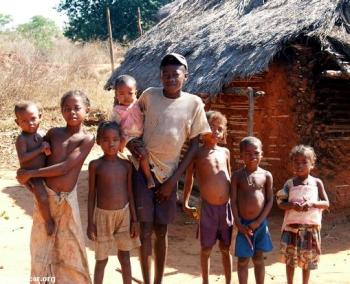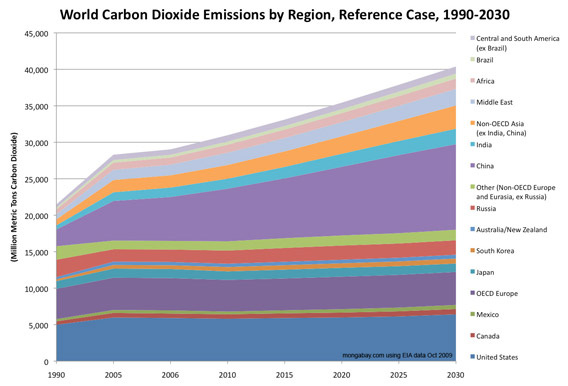A document leaked late in the day at Copenhagen has threatened to further divide developing nations from wealthy countries during the conference in Denmark. The document, labeled as the ‘Danish-text’, is seen by many as sidelining poor countries by handing over climate financing to the World Bank, requiring developing countries to cut total emissions, and in forty years time still allowing wealthy countries to emit more than developing per capita.
Leaked to the Guardian the document was allegedly crafted by Denmark with input from the United States and the UK.
While the document sets out that wealthy countries will create a fund to help developing countries adapt to climate change, monies from this fund would be contingent on developing countries allowing emissions reductions to be monitored. The controls of the fund—which would start with 10 billion dollars from wealthy nations—would also be handed over to the World Bank, a move developing countries oppose since they would like to see the UN oversee the finances.
 Children in Tsianaloka (Manambolo), Madagascar. Photo by: Rhett A. Butler. |
The document also specifies a goal of cutting emissions worldwide by half by 2050. This is opposed by developing nations, most especially China and India, because it would mean they would have to make overall emissions cuts in order to comply. Developing nations have long argued that since wealthy countries are most responsible historically for climate change, they should be making the sacrifices. In addition, the document does not state that Kyoto treaty should continue after its expiration in 2012, though developing countries strongly support Kyoto since it binds wealthy countries—and not developing—to emission targets.
Perhaps most unsettling of all for poorer countries, the document specifies that by 2050 wealthy countries be allowed to emit 2.67 tons per person, while developing countries would be only allowed to emit 1.44 tons per person.
“Like ants in a room full of elephants, poor countries are at risk of been squeezed out of the climate talks in Copenhagen,” Antonio Hill, the Oxfam climate adviser, told the press. “As the talks ramp up and the big players put forward their proposals for the deal, it is vitally important that vulnerable countries are part of the debate.”
Furthermore, environmentalists and activists says the document does not go far enough to ensure the world won’t face warming of 2 degrees Celsius, though this is set out as a goal in the document.
Developing nations fear that the document will be forced on them. Perhaps to give them a better hand in negotiations, Kevin Conrad of Papua New Guinea yesterday called for a ‘nuclear option’, which means that instead of a consensus being needed for an agreement, a majority of only 75 percent would be required.
However, despite frustrations from developing countries over parts of the document’s content, the real test will be how flexible wealthy countries are in negotiations over the next two weeks.
Conference chairman Connie Hedegaard attempted yesterday—before the document was leaked—to downplay the importance of any emerging early documents.
“There are many different kinds of texts circulating but the draft text that might eventually […] be accepted here, that would be at a later stage to sort of circulate,” she said.

Past and projected CO2 emissions for countries, 1990-2030. The Department of Energy’s (DOE) Energy Information Administration’s (EIA) forecasts for emissions from energy use until 2030.
Related articles
Europe says US and China emission targets don’t go far enough
(12/07/2009) At a press conference during the first day of the UN Copenhagen Climate Change Conference, the European Union has stated it will not raise its emissions cuts from 20 percent to 30 percent by 2020 (over 1990 levels) unless the US and China go further in their cuts.

(12/07/2009) Two of the world’s most serious issues—poverty and climate change—are interconnected. With a rise in one’s income there usually comes a rise in one’s carbon footprint, thereby threatening the environment. Wealthy nations have the highest per capita carbon footprints, while developing nations like India and China—which are experiencing unprecedented economic growth—are becoming massive contributors of greenhouse gases. However, it is those who have the smallest carbon footprint—the world’s poor—who currently suffer most from climate change. Food crises, water shortages, extreme weather, and rising sea levels have all hit the poor the hardest.
World requires radical new economic models to fight poverty and mitigate global warming

(11/30/2009) A new report calls for a radical re-envisioning of current economic models in order to tackle poverty, mitigate and adapt to climate change, and solve other environmental problems. The report was crafted by the New Economics Foundation (NEF) and the International Institute for Environment and Development (IIED) and was supported by The Working Group on Climate Change and Development, which includes a wide variety of well-known groups, including environmental, religious, and anti-poverty organizations.













